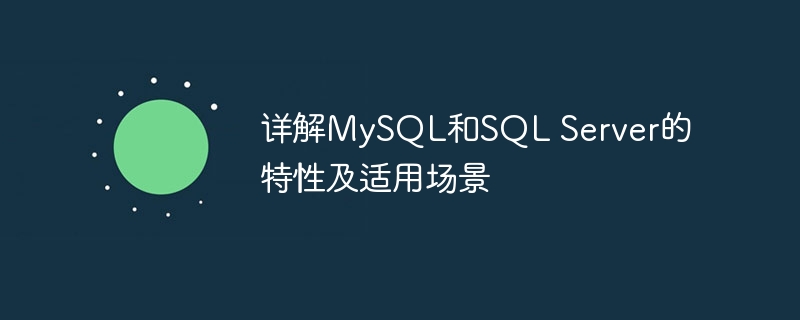

MySQL and SQL Server are two common relational database management systems, which are widely used in enterprise and personal applications. This article will introduce the features and applicable scenarios of MySQL and SQL Server in detail, and provide specific code examples to help readers better understand these two database systems.
1. MySQL features and applicable scenarios
MySQL is an open source relational database management system with the following main features:
MySQL is suitable for small and medium-sized enterprises and individual developers, such as website development, application development and other scenarios. A simple MySQL code example is given below:
-- 创建一个名为customer的表
CREATE TABLE customer (
id INT PRIMARY KEY,
name VARCHAR(50),
email VARCHAR(50)
);
-- 插入一条数据
INSERT INTO customer VALUES (1, 'Alice', 'alice@example.com');
-- 查询表中的数据
SELECT * FROM customer;2. SQL Server features and applicable scenarios
SQL Server is a relational database management system developed by Microsoft and has the following main features:
SQL Server is suitable for application scenarios in large enterprises, finance, medical and other industries. A simple SQL Server code example is given below:
-- 创建一个名为employee的表
CREATE TABLE employee (
id INT PRIMARY KEY,
name VARCHAR(50),
department VARCHAR(50)
);
-- 插入一条数据
INSERT INTO employee VALUES (1, 'Bob', 'HR');
-- 查询表中的数据
SELECT * FROM employee;In summary, MySQL and SQL Server are suitable for database scenarios of different sizes and requirements. When choosing a database management system, you need to make it based on actual needs. Evaluation and selection. I hope that the introduction in this article can help readers better understand MySQL and SQL Server, and enable them to reasonably choose a suitable database system in practical applications.
The above is the detailed content of Detailed explanation of the features and applicable scenarios of MySQL and SQL Server. For more information, please follow other related articles on the PHP Chinese website!




